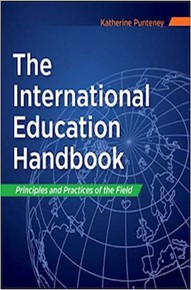Abstract
This review talks about the book entitled: The International Education Handbook: Principles and Practices of the Field, written by the American researcher Katherine Punteney, which has become a reference for educators, who want to know more about the panorama of international higher education, as well as understand the main trends in the field and learn about the practices developed in other educational systems that can be applied to the local reality.
The book has 405 pages distributed in 10 chapters: Trends in International Education; Global Competence; Internationalization; Education Abroad; Experiential Education; International Enrollment Management; International Student and Scholar Services; International Schools; Citizen Diplomacy and Related Fields.
References
BENNETT, Milton J. A developmental approach to training for intercultural sensitivity. International Journal of Intercultural Relations. v. 10, p. 179-196, 1986. Disponível em: https://www.idrinstitute.org/wp-content/uploads/2019/02/DMIS-IJIR.pdf. Acesso em: 11 maio. 2021.
BOIX-MANSILLA, Veronica e JACKSON, Anthony. Educating for Global Competence: Preparing Our Youth to Engage the World. New York, NY: Asia Society and Council of Chief State School Officers, 2011. 136 p. Disponível em: https://asiasociety.org/files/book-globalcompetence.pdf. Acesso em: 11 maio. 2021.
BYRAM, Michael. Teaching and assessing intercultural communication competence. New York: Multilingual Matters, 1997. 136 p.
DEARDORFF, Darla K. Identification and Assessment of Intercultural Competence as a Student Outcome of Internationalization. Journal of Studies in International Education, v.10, n.3, p. 241-266, 2006. https://doi.org/10.1177%2F1028315306287002
KNIGHT, Jane (2004). Internationalization remodeled: Definitions, rationales and approaches. Journal of Studies in International Education, Los Angeles California, SAGE Publication Inc., v. 8, n. 1, p. 5-31, 2004.
KOLB, David A. (1984). Experiential Learning: Experience as the Source of Learning and Development. Upper Saddle River, NJ: Prentice Hall, 1984.
Institute of International Education. Project Atlas 2018 Infographics. Institute of International Education, 2018. Disponível em: https://www.iie.org/Research-and-Insights/Project-Atlas/Explore-Data. Acesso em: 6 abr. 2021.
NAFSA: Association of International Educators. Benefits from International Students. The United States. Washington, DC: NAFSA: Association of International Educators, 2018.
PUNTENEY, Katherine. The international education handbook: principles and practices of the Field. Estados Unidos: NAFSA: Association of International Educators, 2019. ISBN: 978-1942719267.

This work is licensed under a Creative Commons Attribution 4.0 International License.
Copyright (c) 2021 Revista Internacional de Educação Superior


